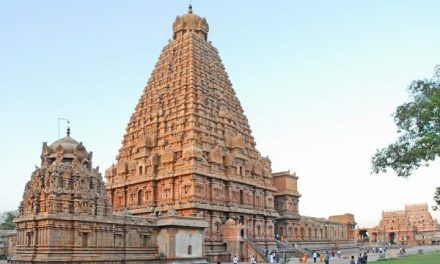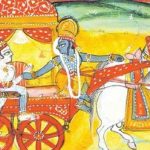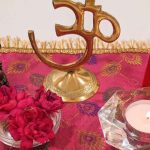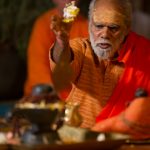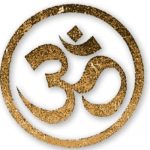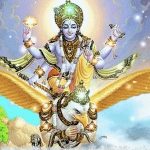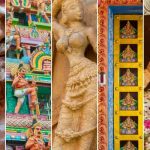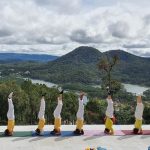 Dharma, Artha, Kama and Moksha: The Four Great Goals of Life
Dharma, Artha, Kama and Moksha: The Four Great Goals of Life
By David Frawley (Pandit Vamadeva Shastri)
Our duty for health and well-being is not simply personal but extends to our family, community, nation, humanity and nature. It implies a seeking to alleviate all suffering and disharmony in the world.
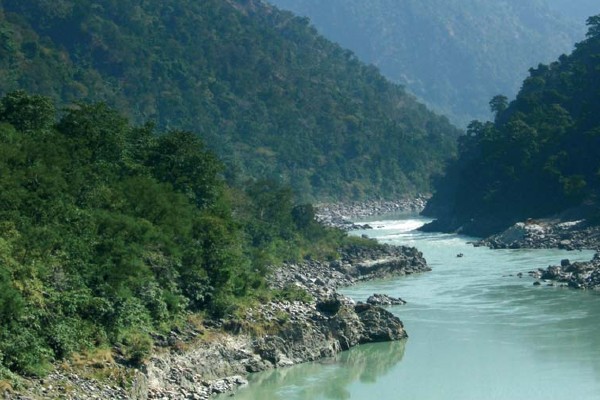 Dharma is the foundation of Vedic counselling, which can also be called “Dharmic counselling.“ This begins with an investigation into what our true dharma in life is and how it relates to the universal Dharma. But dharma is not just of one type only. Dharma refers to the right way of action and awareness on all levels of our being and our entire interaction with the whole of life.
Dharma is the foundation of Vedic counselling, which can also be called “Dharmic counselling.“ This begins with an investigation into what our true dharma in life is and how it relates to the universal Dharma. But dharma is not just of one type only. Dharma refers to the right way of action and awareness on all levels of our being and our entire interaction with the whole of life.
The way of Dharma is subtle and many sided. It cannot be reduced to a mere formula or routine but requires constant adaptation to the movement of life at every moment. There is a famous Sanskrit statement from the Mahabharata that “Dharma protects those who protect Dharma.“ If we do not follow the way of dharma our lives can easily fall under forces of ignorance, disintegration and imbalance. Dharma is our greatest protection in life.
Physical and Psychological Health and Well-Being
Basic health and well-being for body and mind, what is called Arogya in Sanskrit, is the foundation of all our pursuits in life. If we are physically unwell we may not have the energy to pursue the other goals of life, even if we may have the talent or capacity to do so. Similarly, if we are psychologically unwell, our perception and motivation can be impaired. We can make wrong judge ments that can cause us to deviate from our true path.
This fact of the primacy of health provides a special importance to Ayurveda in Vedic counselling, particularly Ayurveda’s foun – dation of right life-style practices for body and mind. Ayurvedic living is the foundation of dharma for physical and psychological balance and harmony. Ayurvedic living is the foundation of dharmic living. Ayurvedic counselling is the foundation of dharmic and Vedic counselling.
Our duty for health and well-being however, is not simply personal but extends to our family, community, nation, humanity and nature. It implies a seeking to alleviate all suffering and disharmony in the world.
The Four Great Dharmas
There are four aspects of Dharma as mentioned in Vedic texts. The four Dharmas or ways of life, are also referred to as the four Purusharthas or goals of human life. While commonly known they are seldom deeply understood.
DHARMA – Living according to our inner purpose
ARTHA – Establishing goals and values that promote it
KAMA – Finding happiness in what we do based upon our Dharma
MOKSHA – Gaining the freedom of consciousness
Dharma, Artha, Kama and Moksha are called the four Dharmas. We can also refer to them as Artha Dharma, Kama Dharma and Moksha Dharma.
The Primary Dharma of One’s Nature
Our primary dharma should rest upon and be part of the universal dharma, of which our soul is the manifestation. Dharma in this deeper sense should be the foundation of our goals, enjoyment and seeking of freedom. However, this is not always the case, particularly today. Modern society usually places wealth and pleasure, aspects of Artha and Kama, before Dharma. Unless our actions are rooted in Dharma, an adharmic pursuit of the goals of life will not bring happiness and peace.
For a dharmic life, one must first ascertain our primary dharma as an individual soul. This consists of one’s personal dharma, one’s social dharma and one’s duty to the universe as a whole. It is the purpose that we have come into this life in order to fulfill and reflects our karmas from previous lives. It is our duty as a Divine soul. Dharma differs according to individual. Our individual dharma or svadharma is reflected in our doshas, gunas and karmas, as well as our unique capacities in life.
It is usually reflected in our vocation and in our spiritual path. Ayurveda and Vedic astrology can help in determining it. A Vedic counsellor should learn this ascertainment of individual dharma as his primary or first task. We may have the dharma of an artist, and entrepreneur, a healer, a yogi or any number of possibilities.
Artha Dharma – Goals and Abundance
Artha refers to the pursuit of the goals and resources of life in a dharmic way. The non-dharmic pursuit f wealth and property is not covered here. We must be very clear and careful as to the goals that we set for ourselves in life. The nature of the goal determines the nature of our striving and the type of energy that we will be creating. Dharmic goals are inclusive and considerate not isolating or promoting of conflict.
Adharmic goals are those based upon violence, selfishness or division. They cannot take us to a meaningful and happy life. Dharmic goals promote dharma. They are goals that help the world overall. Artha implies wealth and abundance, including money. Vedic thought, we should note, is not against accumulation of wealth. But it is important that wealth belongs to the Diving force, which means that it is used to promote higher causes not just personal enjoyment.
To win wealth for the Divine is a great occupation to have and we should honour those who support Dharma with wealth used for the good of all. There should be abundance for everyone and this is possible when we cease trying to take things only for ourselves.
Kama Dharma
Kama Dharma refers to the pursuit of enjoyment, happiness, well-being and bliss through dharma (not just to any pursuit of desires). It does not encourage to run after a life of enjoyment only. We have many modes and avenues of enjoyment available for us. We should seek those enjoyments fete are ennobling to our spirit and help us develop a deeper taste, refinement and sensitivity, avoiding desires that wear us out or make us feel dull and heavy in the end.
We should learn to discriminate between the pursuit of desire and the pursuit of Self-realisation. Not all desires reflect our real needs, capacities and highest goals. Adharmic kama is the pursuit of desire for its own sake, pursuing self-indulgence and dissipation. It is desire that is against dharma and promotes conflict.
Happiness is our very nature. Bliss is our birthright. Our own Self-awareness is Ananda. But we can only experience this happiness in our outer life once we are rooted in right dharma and right use of our resources.
Moksha Dharma
Moksha refers to the pursuit of liberation and higher spiritual knowledge through dharma. It does not include the nondharmic pursuit of religion, in which we are only seeking to convert others to a belief, or the pursuit of the spiritual life through escaping the world and not honouring one’s duty. We are all seeking freedom in life in various ways and like to have a greater space around us.
Yet true freedom is not simply the freedom to get what we want but freedom from the pain and burden of desire, the freedom from outer or worldly com – pulsions. True freedom can only be found in Self-awareness. It is not the freedom to do but the freedom to be. Freedom from desire brings the highest happiness. The ability to get what we want only breeds further wants. The traditional means of pursuing Moksha Dharma is Yoga in the broader sense of principles and practices that develop Self-realisation, primarily meditation.
Freedom is the nature of consciousness, which is life unbounded space. We should not tie ourselves down by the power of attachment. To let go is the highest for of freedom. To be free in our awareness is to be one with all.
Integrality of the Four Dharmas
The four dharmas are not separate but form an integral whole rooted in each other. A proper dharmic orientation in life leads us to seeking dharmic goals and the right use of our wealth and resources. This grants lasting happiness and directs us to the freedom of the soul. Similarly, the spiritual life provides happiness (kama), right organisation of resources (artha), and fulfillment of duty (dharma).
Understanding your Individual Karma and Dharma
Karma and dharma are inherently linked together. We develop and transcend karma through dharma. Our karma or action, should be dharmic or in harmony with the great laws of life. Our dharma similarly must manifest in our karma or action. This creates two simple principles of dharmic action to follow.
AVOIDING ADHARMIC-KARMA – Avoid actions that do not support your life purpose or the good of all.
CULTIVATING DHARMIC-KARMA – Let your actions reflect your dharma. Walk your talk and put your values and principles into manifestation.
All dharmic action is a kind of Karma Yoga. Dharma begins with service to oneself and service to the whole of life. Karma Yoga is the way of Yajna, or making sacred. This supports Dharma, Working for and serving others is a way of inner healing and bringing out our deeper capacities.
Cultivating Higher Values
Dharmic living rests upon a value based education in which we promote enduring and universal values that benefit everyone. Dharma implies that we are ever striving towards something higher, seeking to unfold a higher consciousness in life. It requires effort on our part to improve our lives that directs us to a sadhana or spiritual practice.
Pursuing our dharma means that we are not just doing what we want to do but rather that we are pursuing a way of excellence in which we ever seek to grow, develop and transcend our previous limitations. Dharma means seeking the highest, not following what is convenient. Only when we achieve something new, extraordinary or beyond our previous capacities can we truly feel happy and fulfilled.
Dharmic living rests upon a value based education in which we promote enduring and universal values that benefit everyone. Dharma implies that we are ever striving towards some – thing higher, seeking to unfold a higher consciousness in life.
Examination of Dharma
Part of knowing who we are requires understanding our dharma and discovering our highest purpose of life. Our life has a kind of mission that we must first fulfill. We need to know what this is in order to act in the most responsible and efficacious manner. Note a few key dharmic questions below :
- What is your real purpose in life? – not just short term goals or desires, but what you wish to achieve in your life as a whole and leave as your legacy.
- What is your real purpose in this particular life and incarnation? – What is your background as a soul with many births? Z
- What is your proper role in society? – How can you help others and help uplift humanity, without compromising your own inner purpose?
- What constitutes your true individuality? – Not merely what is unusual or special about you, but what is your unique essence that does not change throughout your life?
- Where does your true and lasting happiness dwell? – as apart from where we may derive the most pleasure or feel the most comfortable.
Reproduced with permission from The Art and Science of Vedic Counseling, by David Frawley, Lotus Press, a division of Lotus Brands, Inc., PO Box 325, Twin Lakes, WI 53181, USA, www.lotuspress.com © 2016 All Rights Reserved
David Frawley is a respected author in the field of Vedic science and yogic spirituality, with over a dozen books published in the United States and India. www.vedanet.com

